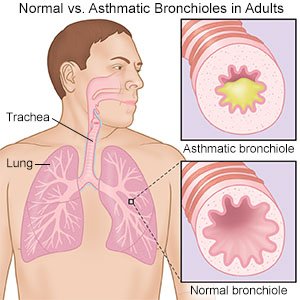Asthma
Medically reviewed by Drugs.com. Last updated on Apr 6, 2025.
Asthma is a lung disease that makes breathing difficult. Chronic inflammation and reactions to triggers narrow the airways in the lungs. Asthma can become life-threatening if it is not managed.
 |
DISCHARGE INSTRUCTIONS:
Call your local emergency number (911 in the US) if:
- You have severe shortness of breath.
- The skin around your neck and ribs pulls in with each breath.
- Your peak flow numbers are in the red zone of your AAP.
Return to the emergency department if:
- You have shortness of breath, even after you take your short-term medicine as directed.
- Your lips or nails turn blue or gray.
Drugs used to treat this and similar conditions
Nucala
Nucala is a monoclonal antibody that reduces levels of eosinophils (a type of white blood cell) ...
Dupixent
Dupixent may be used to treat eczema, eosinophilic or oral-corticosteroid-dependent asthma, chronic ...
Ozempic
Learn about Ozempic (semaglutide) for type 2 diabetes treatment, weight management, cardiovascular ...
Xolair
Xolair injection (omalizumab) is used to reduce the risk of severe food allergy reactions ...
Albuterol
Albuterol is a bronchodilator that relaxes muscles in the airways and increases air flow to the ...
Omalizumab
Omalizumab (Xolair) injection is used to reduce the risk of severe food allergy reactions ...
Dupilumab
Dupilumab (Dupixent) is used to treat eczema, asthma, chronic rhinosinusitis with nasal polyps ...
Mepolizumab
Mepolizumab (Nucala) is a prescription medication FDA-approved for several eosinophil-related ...
Prednisone
Prednisone is used to treat allergic disorders, ulcerative colitis, psoriasis and arthritis. Learn ...
Treatment options
The following list of medications are related to or used in the treatment of this condition.
Call your doctor or asthma specialist if:
- You run out of medicine before your next refill is due.
- Your symptoms get worse.
- You need to take more medicine than usual to control your symptoms.
- You have questions or concerns about your condition or care.
Medicines:
- Medicines may be used to decrease inflammation, open airways, and make it easier to breathe. Medicines may be inhaled, taken as a pill, or injected. Short-term medicines relieve your symptoms quickly. Long-term medicines are used to prevent future asthma attacks. Other medicines may be needed if your regular medicines are not able to prevent attacks. You may also need medicine to help control your allergies. Ask your healthcare provider for more information about any medicine you are given and how to take it safely.
- Take your medicine as directed. Contact your healthcare provider if you think your medicine is not helping or if you have side effects. Tell your provider if you are allergic to any medicine. Keep a list of the medicines, vitamins, and herbs you take. Include the amounts, and when and why you take them. Bring the list or the pill bottles to follow-up visits. Carry your medicine list with you in case of an emergency.
Manage your symptoms and prevent future attacks:
- Follow your Asthma Action Plan (AAP). This is a written plan that you and your healthcare provider create. It explains which medicine you need and when to change doses if necessary. It also explains how you can monitor symptoms and use a peak flow meter. The meter measures how well your lungs are working.
- Manage other health conditions , such as allergies, acid reflux, and sleep apnea.
- Identify and avoid triggers. These may include pets, dust mites, mold, and cockroaches.
- Do not smoke or be around others who smoke. Nicotine and other chemicals in cigarettes and cigars can cause lung damage. Ask your healthcare provider for information if you currently smoke and need help to quit. E-cigarettes or smokeless tobacco still contain nicotine. Talk to your healthcare provider before you use these products.
- Ask about the flu vaccine. The flu can make your asthma worse. You may need a yearly flu shot.
Follow up with your healthcare provider as directed:
You will need to return to make sure your medicine is working and your symptoms are controlled. You may be referred to an asthma or allergy specialist. You may be asked to keep a record of your peak flow values and bring it with you to your appointments. Write down your questions so you remember to ask them during your visits.
© Copyright Merative 2025 Information is for End User's use only and may not be sold, redistributed or otherwise used for commercial purposes.
The above information is an educational aid only. It is not intended as medical advice for individual conditions or treatments. Talk to your doctor, nurse or pharmacist before following any medical regimen to see if it is safe and effective for you.
Learn more about Asthma
Treatment options
Care guides
- Asthma
- Asthma in Children
- COPD (Chronic Obstructive Pulmonary Disease)
- Exercise-Induced Bronchoconstriction
- Moderate and Severe Persistent Asthma
- Reactive Airways Disease
Symptoms and treatments
Medicine.com guides (external)
Further information
Always consult your healthcare provider to ensure the information displayed on this page applies to your personal circumstances.
